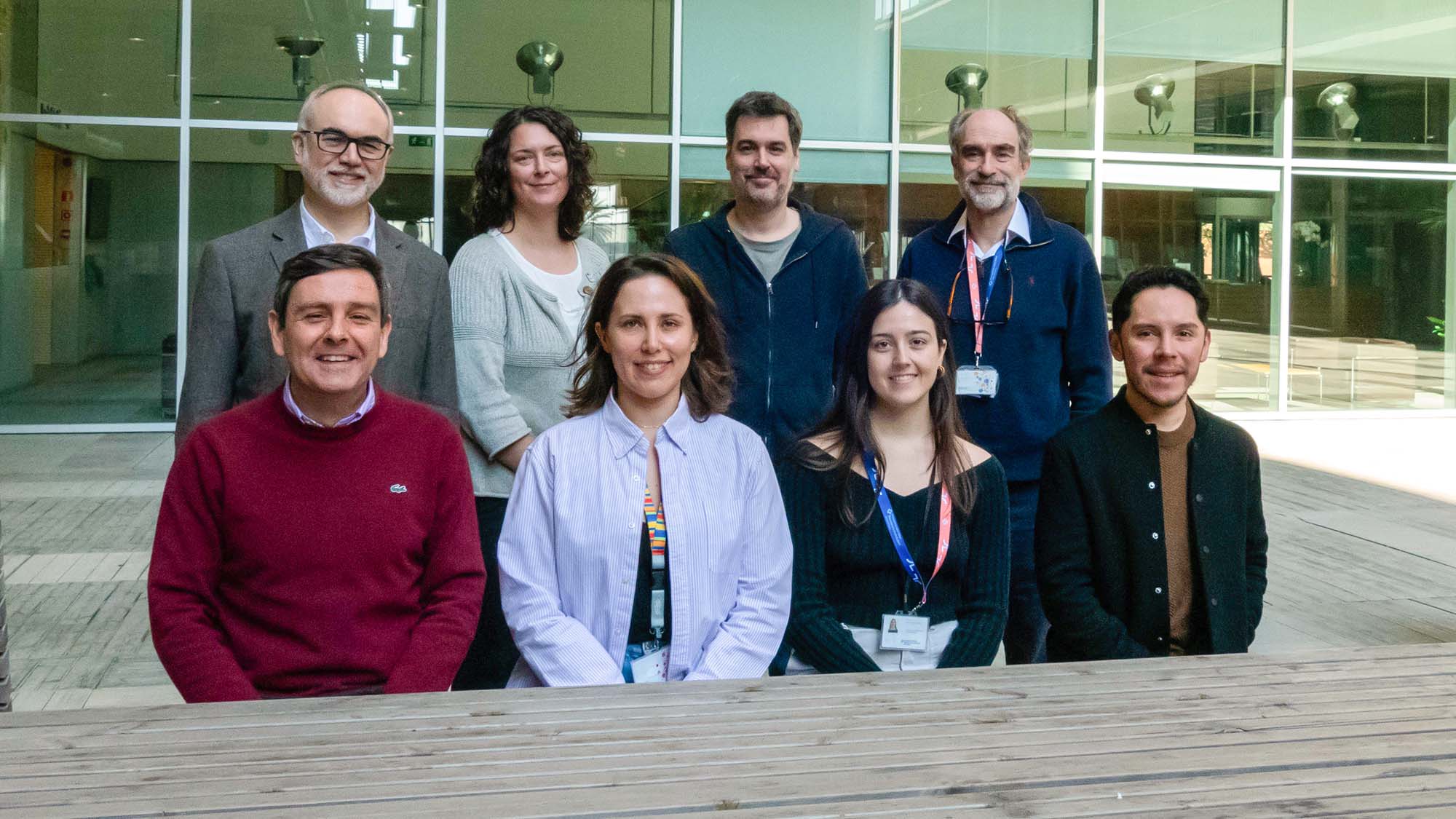Infection with Epstein-Barr virus (EBV) is believed to be the leading cause triggering multiple sclerosis (MS), an autoimmune chronic inflammatory and degenerative disease that affects the central nervous system. However, only very few EBV infected people develop MS. A new European project with the participation of three of the PRBB centres has set to understand why that is, as well as the underlying mechanism of the process.
The project, led by the University of Bergen, will also investigate whether targeting the EBV infection with antiviral treatments can improve the disease course or stop disease progression.
Multiple Sclerosis, a leading cause of neurological debilitation
The EBV-MS project, participated by leading universities and hospitals both in Europe and the USA and with 7 million € funding from the EC, started in December 2023 and will last 5 years.
The project feeds on the discovery, in 2022, of a close but complex link between the Epstein-Barr virus (EBV) and the risk of developing MS. Although it is nearly impossible to have MS without having been infected by the virus, only about 0.3% of the people who have had EBV infection (which is more than 95% of the global population) end up developing MS.
As the leading cause of neurological debilitating problems in young to middle-aged people and with no existing cure, a better understanding of multiple sclerosis (MS) underlying causes and potential treatments would be a great improvement.
Three PRBB institutions lead the work on data management, genetic analysis and AI
Surprisingly for a Horizon Europe-funded project, which to increase international collaboration tend to avoid having several labs and research teams from the same country, the EBV-MS project includes three Barcelona Biomedical Research Park (PRBB) partners leading important work packages – something that highlights the excellence at PRBB.
The PRBB partners include the European Genome-phenome Archive (EGA)/Centre for Genomic Regulation (CRG), the Department of Medicine and Life Sciences (MELIS-UPF) and the Hospital del Mar Research Institute (HMRIB).
- Jordi Rambla and Amy Curwin (EGA from CRG) are leading the data management work package for the project.
- Arcadi Navarro (UPF/CRG) and Gabriel Santpere (HMRIB) are leading the work package related to viral GWAS or VGWAS.
- Pablo Villoslada (UPF/HMRIB) and Jordi Garcia-Ojalvo (UPF) are leading the work package related to prediction and prevention using AI.
Data management, crucial for the reproducibility and impact of the project
Jordi Rambla and Amy Curwin (EGA from CRG) are leading the data management work package for the project. “At EGA we are involved in many EU and national projects taking on the role of leading data management, and doing so efficiently is crucial for ensuring reproducibility, collaboration, and long-term impact of the project”, says Amy Curwin, scientific project manager at EGA.
When asked about the challenges of data management in this specific project, Curwin says: “There are many! The EBV-MS project deals with sensitive health and genomic data, which comes with its ethical and legal considerations. Also, we are dealing with large amounts of data from a diverse set of sources: both pre-existing and new experimental data, data from clinical trials, large-scale genomics and AI-driven analyses. And of course, the project requires collaboration across different institutions and countries, each with their own standards and regulations”.
“There are many challenges – ethical, legal, logistic, technical – of using sensitive data, from varied sources and countries. But a good data management plan is crucial to ensure reproducibility and long-term impact of the project”
Amy Curwin (EGA/CRG)
The job of the EGA members as leaders of this work package is to accompany the rest of the partners in each step of the research process, ensuring the data follows the FAIR (Findable, Accessible, Interoperable and Reusable) principles, and is secure and preserved in the long term. To know more about the research data management in the EBV-MS project, check out this piece at the University of Bergen.
Maths and AI to decipher risks and biological processes
EBV-MS aims to conduct clinical trials with antivirals, to see if attacking the virus could improve MS; to identify immune cell signatures associated with EBV infection; and to use machine learning to predict and prevent MS. The work package led by Pablo Villoslada (UPF/HMRIB) and Jordi Garcia-Ojalvo (UPF) deals with this last part.
Pablo Villoslada, in collaboration with Ricardo Baeza-Yates, is using AI, machine learning models and advanced analytics to uncover patterns and predictions from the current data on EBV-related MS research, to be able to detect individuals at high risk of developing MS before they develop symptoms.
Jordi Garcia-Ojalvo and his team are taking a different approach, starting from the working mechanisms of the virus to understand its role in the disease. “Our goal is to develop mechanistic mathematical models that enable us to distinguish among the potential biological processes through which the Epstein-Barr virus influences a complex autoimmune disease such as multiple sclerosis”, says Garcia-Ojalvo, who adds: “Our challenge now is to correctly parameterize the mathematical models with experimental data, so that they are realistic”.
“Mathematics is very useful because it allows us to dream different worlds, which do not necessarily exist in reality, to evaluate the validity of different hypothesis to explain observations of biomedical relevance.”
Jordi Garcia-Ojalvo (MELIS-UPF)
The complex genetics interplay between host and virus
The work package led by Arcadi Navarro and Gabriel Santpere uses bioinformatics analysis to look at the different EBV variants (of which there are thousands) and the different host variants, and see how their interaction affects the risk of developing MS.
The idea is that some individuals may have more risk for MS because of their alleles, because of the EBV alleles, or because of an interaction between the two, which is still not well understood. “EBV is the necessary cause of MS, but 90% of us are infected by EBV and most do not have MS, so it is worth looking at whether EBV and host’s genetics interaction helps to clarify this mystery”, explains Gabriel Santpere.
“We want to see whether a combination of a particular variant of the virus in a host with specific genetics leads to an increased risk of MS”
Gabriel Santpere (HMRIB)
Regarding host genetics, they are looking at the host HLA-type, because different HLA variants can influence how well the immune system responds to pathogens or conditions, and some HLA variants have been linked to an increased risk of developing certain autoimmune disease, including MS. They also look at common host genetic variants that have been shown to be highly associated with MS from a previous genome-wide association study (GWAS).
As per the virus genome, they are doing VGWAS – a genome-wide association study but with the viral genome, rather than the host’s – to search for variants of EBV associated with MS.
Arcadi Navarro is responsible for coordinating the collection and centralization of saliva samples from controls and MS patients, from several hospitals in Spain and other countries, so they can sequence them and do these association tests.
The path to improve lives of multiple sclerosis patients
So far, the EBV-MS project has laid a solid foundation for collaboration and data-driven discovery. One key milestone has been the successful launch and full recruitment of participants in the clinical trial testing antiviral treatments that may target EBV in people with MS. In parallel, a new work package on Computational Drug Repurposing has been initiated, with a new partner organisation, which brings additional expertise and synergies to enrich the genetic and immunological dimensions of the researchers. The Consortium is now entering an exciting phase, as data from clinical trials and experimental models begin to flow in and analyses are underway.
The Consortium is also looking to involve stakeholders, including not only researchers and clinicians, but also policymakers, and patient advocacy groups, in shaping the project’s direction.
One year into this five-year journey, the EBV-MS project, through collaboration across disciplines and institutions, is steadily progressing toward its goal: to deepen our understanding of the role of Epstein-Barr virus in multiple sclerosis and ultimately, pave the way to better and innovative therapies and preventive strategies that could transform the lives of people affected by MS.
If you are interested in keeping abreast of the project developments you can subscribe to their newsletter here.







